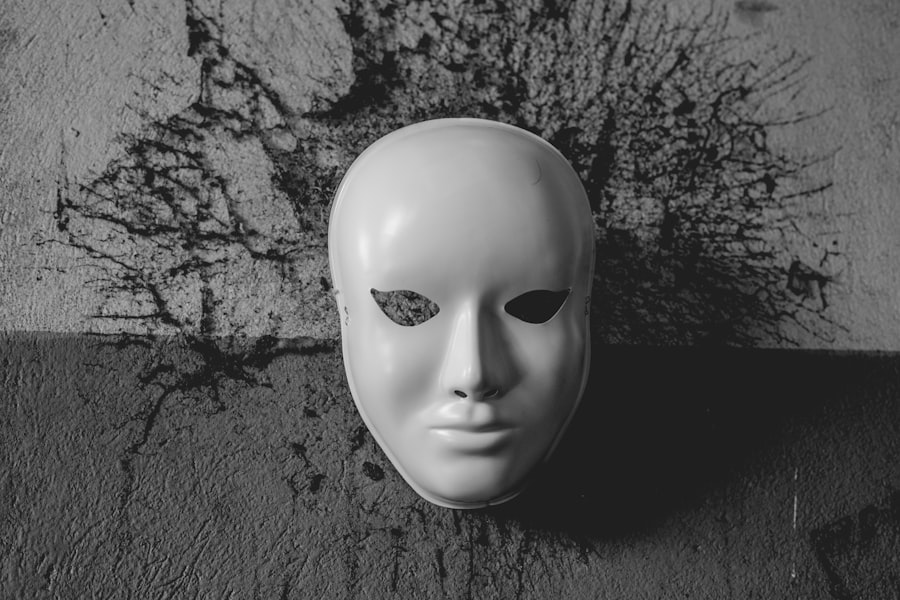Depersonalization and derealization are psychological phenomena that can leave you feeling detached from your own thoughts, feelings, or sense of self. When you experience depersonalization, it may feel as though you are observing yourself from outside your body, as if you are a spectator in your own life. This sensation can be disorienting and unsettling, often leading to a sense of confusion about your identity and reality.
You might find yourself questioning whether your experiences are genuine or if you are merely going through the motions of life without truly engaging with it. On the other hand, derealization involves a sense of detachment from your surroundings. You may perceive the world around you as unreal or distorted, as if you are living in a dream or a movie.
Everyday objects and people may seem unfamiliar or distant, contributing to a feeling of isolation. Both depersonalization and derealization can occur independently or together, often triggered by stress, trauma, or substance use. Understanding these experiences is crucial for recognizing their impact on your mental health and well-being.
Key Takeaways
- Depersonalization is a mental health condition where a person feels detached from their thoughts, feelings, and body, while derealization is a condition where a person feels detached from their surroundings.
- Cannabis use has been linked to triggering depersonalization and derealization in some individuals, especially those who use it frequently or in high doses.
- Symptoms of depersonalization and derealization include feeling like an outside observer of one’s thoughts or body, feeling like the world is unreal or distorted, and experiencing emotional numbness.
- Cannabis use can trigger depersonalization and derealization by altering brain chemistry and increasing anxiety and paranoia, especially in individuals who are predisposed to these conditions.
- Managing depersonalization and derealization symptoms after cannabis use may involve seeking professional help, practicing stress-reducing techniques, and avoiding further cannabis use.
The Connection Between Cannabis Use and Depersonalization/Derealization
Cannabis use has gained popularity for its perceived benefits, including relaxation and euphoria. However, for some individuals, it can also lead to adverse psychological effects, including depersonalization and derealization. The connection between cannabis and these dissociative experiences is complex and varies from person to person.
While some users report enhanced sensory perception and creativity, others may find themselves grappling with feelings of detachment and disconnection. Research suggests that the psychoactive compound in cannabis, THC (tetrahydrocannabinol), can alter brain function and perception.
The experience of being high can sometimes blur the lines between reality and imagination, leading to sensations that mimic depersonalization or derealization. Understanding this connection is essential for those who use cannabis recreationally or medicinally, as it highlights the importance of being aware of how it may affect your mental state.
Symptoms of Depersonalization and Derealization

The symptoms of depersonalization and derealization can manifest in various ways, often leading to significant distress. When experiencing depersonalization, you might notice a sense of emotional numbness or a feeling that your thoughts are not your own. You may struggle to connect with your emotions or feel as though you are watching your life unfold from a distance.
This disconnection can lead to difficulties in relationships and daily functioning, as you may find it challenging to engage fully with others or your environment. Derealization symptoms can include visual distortions, such as objects appearing blurry or out of focus, or a sense that the world lacks depth and color. You might feel as though you are in a fog or that time is moving differently than usual.
These experiences can be frightening and disorienting, often leading to increased anxiety or panic attacks. Recognizing these symptoms is crucial for understanding your mental health and seeking appropriate support when needed.
How Cannabis Use Can Trigger Depersonalization and Derealization
| Factors | Impact |
|---|---|
| Cannabis potency | Higher potency increases risk of depersonalization and derealization |
| Frequency of use | Regular use can increase likelihood of experiencing symptoms |
| Individual susceptibility | Some individuals may be more prone to these effects |
| Psychological factors | Underlying anxiety or trauma can exacerbate symptoms |
Cannabis use can trigger depersonalization and derealization in several ways. The psychoactive effects of THC can heighten anxiety levels in some users, leading to feelings of paranoia or fear. When anxiety levels rise, it can create a fertile ground for dissociative experiences to occur.
You may find that the very substance you intended to use for relaxation instead amplifies feelings of disconnection from yourself and your surroundings. Additionally, the dosage and strain of cannabis can play a significant role in how it affects you. High-THC strains may be more likely to induce anxiety and dissociation compared to those with higher levels of CBD (cannabidiol), which is known for its calming properties.
If you are prone to anxiety or have a history of mental health issues, using cannabis without understanding its potential effects on your psyche can lead to uncomfortable experiences.
Managing Depersonalization and Derealization Symptoms After Cannabis Use
If you find yourself experiencing symptoms of depersonalization or derealization after using cannabis, there are several strategies you can employ to manage these feelings. Grounding techniques can be particularly effective in helping you reconnect with reality. Engaging in activities that stimulate your senses—such as touching different textures, listening to music, or focusing on your breath—can help anchor you back in the present moment.
Another approach is to practice mindfulness meditation. By focusing on your thoughts and feelings without judgment, you can create a sense of awareness that allows you to observe your experiences rather than becoming overwhelmed by them. Journaling about your feelings can also provide an outlet for processing what you’re going through, helping you articulate your thoughts and emotions more clearly.
These techniques can empower you to regain control over your mental state after an unsettling experience.
Seeking Professional Help for Depersonalization and Derealization

If depersonalization and derealization symptoms persist or significantly impact your daily life, seeking professional help is crucial. A mental health professional can provide support tailored to your specific needs, helping you explore the underlying causes of your experiences. Therapy options such as cognitive-behavioral therapy (CBT) have been shown to be effective in treating dissociative symptoms by addressing negative thought patterns and developing coping strategies.
In some cases, medication may also be considered as part of a comprehensive treatment plan. A psychiatrist can evaluate whether medication might help alleviate symptoms associated with anxiety or depression that could be contributing to your dissociative experiences. Remember that reaching out for help is a sign of strength; taking proactive steps toward understanding and managing your mental health is essential for long-term well-being.
Preventing Depersonalization and Derealization from Cannabis Use
Preventing depersonalization and derealization related to cannabis use involves being mindful of how you approach consumption. Start by educating yourself about different strains and their effects; opting for strains with higher CBD content may reduce the likelihood of experiencing anxiety or dissociation. Additionally, consider moderating your intake—using smaller amounts can help you gauge how cannabis affects you personally without overwhelming your system.
Creating a safe environment for consumption is also important. Surround yourself with trusted friends who can provide support if needed, and choose settings that feel comfortable and familiar. Avoid using cannabis during times of high stress or emotional turmoil, as these factors can increase the risk of triggering dissociative experiences.
By taking these precautions, you can enjoy cannabis while minimizing the potential for negative psychological effects.
Understanding the Long-Term Effects of Cannabis Use on Depersonalization and Derealization
The long-term effects of cannabis use on depersonalization and derealization are still being studied, but emerging research suggests that frequent use may contribute to persistent dissociative symptoms in some individuals. Regular exposure to THC can alter brain chemistry over time, potentially leading to changes in how you process emotions and perceive reality. For those predisposed to anxiety or other mental health conditions, long-term cannabis use may exacerbate feelings of detachment.
It’s essential to reflect on your relationship with cannabis and consider how it impacts your mental health over time. If you notice an increase in dissociative symptoms or find that they interfere with your daily life, it may be worth reevaluating your usage patterns or seeking professional guidance. Understanding the potential long-term implications of cannabis use empowers you to make informed decisions about your mental well-being and overall health.
In conclusion, while cannabis may offer benefits for some individuals, it is crucial to recognize its potential risks regarding depersonalization and derealization. By understanding these phenomena, their connection to cannabis use, and effective management strategies, you can navigate your experiences more effectively. Whether through self-help techniques or professional support, taking proactive steps toward understanding your mental health will ultimately lead to greater well-being and fulfillment in life.
Depersonalization and derealization are dissociative experiences that can sometimes be triggered by the use of cannabis. These experiences can be unsettling, leading individuals to feel disconnected from themselves or their surroundings. For those interested in understanding more about the psychological effects of cannabis and how it can influence mental states, an insightful article can be found on Unplugged Psych. This resource delves into various psychological phenomena and offers a comprehensive look at how substances like cannabis can impact mental health. To explore this topic further, you can read more on their website.
LEARN MORE About Depersonalization & Derealization
FAQs
What is depersonalization-derealization disorder?
Depersonalization-derealization disorder is a mental health condition characterized by feeling detached from oneself (depersonalization) and/or feeling that the world around you is unreal or distorted (derealization).
What are the symptoms of depersonalization-derealization disorder?
Symptoms of depersonalization-derealization disorder may include feeling like an outside observer of your thoughts, feelings, and actions (depersonalization), feeling like the world around you is distorted or unreal (derealization), emotional numbness, and a sense of detachment from your surroundings.
What is the relationship between depersonalization-derealization disorder and weed (cannabis)?
Some individuals may experience depersonalization-derealization symptoms after using weed (cannabis). This can be a result of the psychoactive effects of cannabis on the brain.
Can depersonalization-derealization disorder be triggered or worsened by weed (cannabis) use?
For some individuals, using weed (cannabis) can trigger or worsen symptoms of depersonalization-derealization disorder. It is important to note that not everyone who uses cannabis will experience these symptoms.
What should I do if I experience depersonalization-derealization symptoms after using weed (cannabis)?
If you experience depersonalization-derealization symptoms after using weed (cannabis), it is important to seek help from a mental health professional. They can provide support, guidance, and treatment options to help manage these symptoms.




